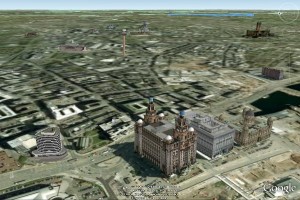Access to Historic Liverpool data
Liverpool Landscapes was a blog charting new discoveries, news and developments affecting Liverpool's historic environment. It was regularly updated between 2007 and 2016.
Liverpool Landscape has now been retired, and most of the less time-dependent articles moved to Historic Liverpool.
In the spirit of free exchange of data, I’ve been looking into methods of sharing the data which I produce as part of the Historic Liverpool website. Although still a relatively low number, I will be producing ESRI shapefiles which are used to power the maps. As the About this website page explains, the layers of Listed Buildings, Parks and Gardens, Scheduled Monuments and World Heritage Sites are from the NMR’s Data Download service, where you can get hold of the national data after signing up for an account. I can’t redistribute the NMR’s data, but I intend to post direct links to my own created layers in due course. There are many ways of doing this, but an important question is one of data formats. Which data formats can I be certain that people can use, for free? Well, I know shapefiles can be used in such free (as in open source) software as QGIS, but I’d like to be able to give out data which is viewable in Google Earth, as this is a popular, free (as in no cost) piece of software which provides background mapping, which are near-impossible to come across in the UK for sensible amounts of money. It would also be great to be able to integrate my data with fun stuff such as topography and 3D historic buildings, of which a handful from Liverpool are available on Google Earth.
At the moment I’m therefore looking for ways to convert shapefiles to KML files (which can also be viewed in Google Maps without the need to download extra software). There are several programs simply called ‘SHP2KML’ which claim to do the job. If anyone’s done this before, or knows a better way to do this, I’d be grateful to hear it. Otherwise I’ll be studying the manuals for the ever-useful FWTools command-line programs.
Finally, on the topic of online resources, Wolfram Alpha is a new “computational knowledge engine”. It works like a search engine, but instead of bringing back a series of web pages which probably contain your results, it tries to reply with the results themselves. This is best seen in demonstration, so try going to the site and typing “population of liverpool” and see what you get!




